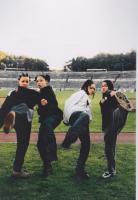 I think it was really a mixture from the beginning but black teenagers from all the African ex-colonies, marginalised people, recognised themselves in the lyrics of American groups that talked about racism and social injustice, which they experienced in the US.
But since the beginning, white kids that were in school with these black communities liked the music, the attitude, the aesthetic and began to rap. So, it was a mixture from the beginning. General D, the first rapper to release an album in Portugal has Mozambican origins, for example. Nelson Neves, who is an important person in the film, was the one who brought the music from Paris because he spent vacations there, and he's the son of Cape Verdean parents. In Rapública you have white artists like Líderes de Nova Mensagem, which was a band that had black and white musicians, rappers and DJs, and they're from Almada.
I think it was really a mixture from the beginning but black teenagers from all the African ex-colonies, marginalised people, recognised themselves in the lyrics of American groups that talked about racism and social injustice, which they experienced in the US.
But since the beginning, white kids that were in school with these black communities liked the music, the attitude, the aesthetic and began to rap. So, it was a mixture from the beginning. General D, the first rapper to release an album in Portugal has Mozambican origins, for example. Nelson Neves, who is an important person in the film, was the one who brought the music from Paris because he spent vacations there, and he's the son of Cape Verdean parents. In Rapública you have white artists like Líderes de Nova Mensagem, which was a band that had black and white musicians, rappers and DJs, and they're from Almada.
13.07.2025 | by Graham Douglas
 I also think his music is quite special, and he was a very special person. He was very generous, doing a lot of social work, working with street children. He was very engaged in working for a society in the ‘90s that was starting to develop its own independence, since it was formally declared in 1974. It's not just his music, it's also the way he uses stories about the people that live in Santiago, in the interior and rural areas of the island.
I also think his music is quite special, and he was a very special person. He was very generous, doing a lot of social work, working with street children. He was very engaged in working for a society in the ‘90s that was starting to develop its own independence, since it was formally declared in 1974. It's not just his music, it's also the way he uses stories about the people that live in Santiago, in the interior and rural areas of the island.
28.05.2025 | by Graham Douglas
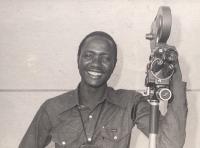 He tells us about the important and complex mission that Amílcar Cabral delegated to them and what it was like to learn the crushing news of his assassination in the middle of this process. It fell to him as his first job to film Amílcar Cabral at an exhibition on the struggle in Conakry, in 1972, and then the transferring of his body to Bissau, capturing the commotion of the Guineans at the death of their greatest thinker and anti-colonial resistance leader.
He tells us about the important and complex mission that Amílcar Cabral delegated to them and what it was like to learn the crushing news of his assassination in the middle of this process. It fell to him as his first job to film Amílcar Cabral at an exhibition on the struggle in Conakry, in 1972, and then the transferring of his body to Bissau, capturing the commotion of the Guineans at the death of their greatest thinker and anti-colonial resistance leader.
17.03.2025 | by Marta Lança
 A meeting with the authors of Tribuna Negra: Origens do Movimento Negro em Portugal (1911-1932), Cristina Roldão, José Pereira and Pedro Varela, resulted in this long conversation at BUALA.
The book presents a complex plot that neatly ties together the available information and many loose ends. As a research stance, the authors' interrogative formulation, acknowledging the limitations, leaves unanswered what we still don't know: “what have they said?”, “what have they done?”, it creates new questions and confirms how much research is yet to be done on Black Lisbon at the beginning of the 20th century. In fact, by reading the book, you get the feeling that each chapter could be another book.
A meeting with the authors of Tribuna Negra: Origens do Movimento Negro em Portugal (1911-1932), Cristina Roldão, José Pereira and Pedro Varela, resulted in this long conversation at BUALA.
The book presents a complex plot that neatly ties together the available information and many loose ends. As a research stance, the authors' interrogative formulation, acknowledging the limitations, leaves unanswered what we still don't know: “what have they said?”, “what have they done?”, it creates new questions and confirms how much research is yet to be done on Black Lisbon at the beginning of the 20th century. In fact, by reading the book, you get the feeling that each chapter could be another book.
22.02.2025 | by Marta Lança
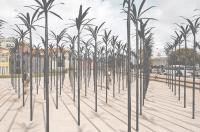 It is important that a public work (especially a memorial) does not show just one face, but that it opens up to different readings. It is a plantation in mourning, burned, which reflects the lugubrious and funerary side of the plantation. And it also pays tribute to the resistance of the enslaved by the gesture of burning the plantation and boycotting the regime of oppression. The plantation is where the process of dehumanization occurs.
It is important that a public work (especially a memorial) does not show just one face, but that it opens up to different readings. It is a plantation in mourning, burned, which reflects the lugubrious and funerary side of the plantation. And it also pays tribute to the resistance of the enslaved by the gesture of burning the plantation and boycotting the regime of oppression. The plantation is where the process of dehumanization occurs.
19.06.2024 | by Marta Lança
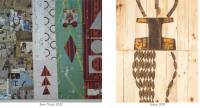 Toy Boy has followed the various stages of the country’s post-independence and initiated his artistic practice after the civil war. His work is an expression of life in Luanda, intrinsically linked to the suffering and creativity one feels in the streets. In tune with the city’s artistic movements and circles (such as Elinga Teatro and Fuckin’ Globo), Toy Boy tells us his story with the sincerity and sensitivity that describe him. Dribbling the difficulties in his path and the need for survival, he appropriates a certain pop art, making collages or ready-mades, installations, and using recycled materials such as rust, but, above all, he gives body and voice to the singularities of urban life. In Luanda 2022.
Toy Boy has followed the various stages of the country’s post-independence and initiated his artistic practice after the civil war. His work is an expression of life in Luanda, intrinsically linked to the suffering and creativity one feels in the streets. In tune with the city’s artistic movements and circles (such as Elinga Teatro and Fuckin’ Globo), Toy Boy tells us his story with the sincerity and sensitivity that describe him. Dribbling the difficulties in his path and the need for survival, he appropriates a certain pop art, making collages or ready-mades, installations, and using recycled materials such as rust, but, above all, he gives body and voice to the singularities of urban life. In Luanda 2022.
12.06.2024 | by Marta Lança
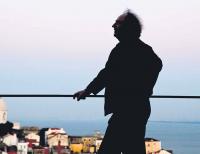 French ethnologist Jean-Yves Loude returned to the “black city” for a workshop on the figure of Lisbon in literature (you can consult the program here) and insists on counteracting the manipulation of facts that erases the African contribution to the great achievements of the world.
In Lisbon in the Black City (2003) the narrator discovered a city full of signs of this African presence and showed us this privilege as Lisbon residents.
French ethnologist Jean-Yves Loude returned to the “black city” for a workshop on the figure of Lisbon in literature (you can consult the program here) and insists on counteracting the manipulation of facts that erases the African contribution to the great achievements of the world.
In Lisbon in the Black City (2003) the narrator discovered a city full of signs of this African presence and showed us this privilege as Lisbon residents.
16.05.2024 | by Marta Lança
 In Kwanza-Sul, she noticed the various rhythms and grandiosity of a country that cultivates laughter and a short memory to defend itself from the dramas that dehumanize it: slavery, colonialism, domination, small and large powers, opportunism, and ignorance. How dizzying the scheme of history in everyday life is. The generation to which she belongs worried about recovering the lost cultural memory in these violences and others, also with a vivid and intriguing look of the naivety and militancy of independence. I
In Kwanza-Sul, she noticed the various rhythms and grandiosity of a country that cultivates laughter and a short memory to defend itself from the dramas that dehumanize it: slavery, colonialism, domination, small and large powers, opportunism, and ignorance. How dizzying the scheme of history in everyday life is. The generation to which she belongs worried about recovering the lost cultural memory in these violences and others, also with a vivid and intriguing look of the naivety and militancy of independence. I
13.04.2024 | by Marta Lança
 For a long time, we treated art as an illustration, the idea that it was a product of its context. But what if we inverted that, since we live in an image civilization, and think of an image as a production, not a product, it produces values, it produces conceptions. And also, when you criticize internally that whiteness classification, we can go through a lot of different questions: who are the people being portrayed? They are, in general, men.
For a long time, we treated art as an illustration, the idea that it was a product of its context. But what if we inverted that, since we live in an image civilization, and think of an image as a production, not a product, it produces values, it produces conceptions. And also, when you criticize internally that whiteness classification, we can go through a lot of different questions: who are the people being portrayed? They are, in general, men.
28.03.2024 | by Marta Lança
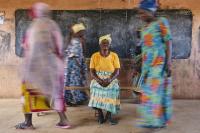 Lee-Ann Olwage, who admits she struggles with her own mental health issues, also has family members who have suffered or are suffering from Alzheimer's. For this reason, she states that, with her work, she aims to create a space in which the people she photographs can play an active role in creating the images and that, above all, makes them feel like the true “heroines” of their own stories.
Lee-Ann Olwage, who admits she struggles with her own mental health issues, also has family members who have suffered or are suffering from Alzheimer's. For this reason, she states that, with her work, she aims to create a space in which the people she photographs can play an active role in creating the images and that, above all, makes them feel like the true “heroines” of their own stories.
13.12.2023 | by Mariana Moniz
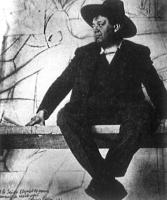 It is said in Mexico that good life stories are passionate. They are happy and painful, they tie and untie blind knots in the throat, like a harsh swallow of cheap tequila.
We set the tone and enter one of the taciturn taverns of the city of Guanajuato - the so-called "cantinas", where personal tales are distilled as the glasses advance. Rough stone walls in the half-light, damp breath. In my head, Chavela Vargas sings "Tú me acostumbraste." It's night and it's raining softly outside.
With a toast, we seal the moment. And we tell a secret life story.
It is said in Mexico that good life stories are passionate. They are happy and painful, they tie and untie blind knots in the throat, like a harsh swallow of cheap tequila.
We set the tone and enter one of the taciturn taverns of the city of Guanajuato - the so-called "cantinas", where personal tales are distilled as the glasses advance. Rough stone walls in the half-light, damp breath. In my head, Chavela Vargas sings "Tú me acostumbraste." It's night and it's raining softly outside.
With a toast, we seal the moment. And we tell a secret life story.
27.05.2023 | by Pedro Cardoso
 Two hours with Mia Couto in an engaging conversation that covers various aspects of his interests and career, his affective geographies, the diversity of peoples and their ways of life as inspiration for the stories, the environment, and the development model to be discovered, and how to treat nature not as a "resource". We talked about hard times of violence, and the utopia of Mozambican Independence. Literary subjects do not predominate, although the Mozambican author wishes he had more time to dedicate to writing. Also thinking about how to take the pleasure of reading further and how to help bring out new writers. A writer in the terrain.
Two hours with Mia Couto in an engaging conversation that covers various aspects of his interests and career, his affective geographies, the diversity of peoples and their ways of life as inspiration for the stories, the environment, and the development model to be discovered, and how to treat nature not as a "resource". We talked about hard times of violence, and the utopia of Mozambican Independence. Literary subjects do not predominate, although the Mozambican author wishes he had more time to dedicate to writing. Also thinking about how to take the pleasure of reading further and how to help bring out new writers. A writer in the terrain.
22.05.2023 | by Marta Lança
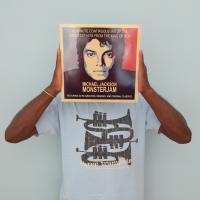 Balanced between various cultures, he has lived for 31 years in a more open and diverse Lisbon, an openness and diversity to which people like Lucky have contributed so much, from building the city to making the city dance.
This is a city of hard times, but also of encounters and possibilities with which he has grown up. In this text, we are led by the memories of Dj Lucky, between various sound tracks of quisange, semba, and afro blues, and multiple tracks on the floor, from Kinshasa to the Graça neighborhood, passing through Luanda, Cova da Moura, and Bairro Alto.
Balanced between various cultures, he has lived for 31 years in a more open and diverse Lisbon, an openness and diversity to which people like Lucky have contributed so much, from building the city to making the city dance.
This is a city of hard times, but also of encounters and possibilities with which he has grown up. In this text, we are led by the memories of Dj Lucky, between various sound tracks of quisange, semba, and afro blues, and multiple tracks on the floor, from Kinshasa to the Graça neighborhood, passing through Luanda, Cova da Moura, and Bairro Alto.
15.11.2022 | by Marta Lança
 Stuart Hall’s ironic use of “the west and the rest” is very real in the fixation among South Africans with “us” and “Africa”. It was encouraging that a sense of South Africa’s inextricable connectedness to the rest of the continent surfaced at moments in the FMF struggle. But the curiosity about and interest in African politics, literature, and academic knowledge still hasn’t really taken off, whether among students or established scholars.
Stuart Hall’s ironic use of “the west and the rest” is very real in the fixation among South Africans with “us” and “Africa”. It was encouraging that a sense of South Africa’s inextricable connectedness to the rest of the continent surfaced at moments in the FMF struggle. But the curiosity about and interest in African politics, literature, and academic knowledge still hasn’t really taken off, whether among students or established scholars.
30.05.2022 | by Sean Jacobs
 I think we always have the responsibility of looking into the ghosts of these colonial dreams and taking the ideas further. For example, we must rethink what are artwork features and what exactly defines them? Institutions change, in a slow and tedious way, but it happens. If we also think about the thesis and how it is configurated, how free can we be about the aesthetic part of it? Now we can offer “decolonize art studies” as a course. All the reconfigurations are a very long process to be achieved. A very important thing I would like to highlight is that where you are you must do your work and contribution. We should try to influence others with our work, inspiring them and trying to change what we know is wrong.
I think we always have the responsibility of looking into the ghosts of these colonial dreams and taking the ideas further. For example, we must rethink what are artwork features and what exactly defines them? Institutions change, in a slow and tedious way, but it happens. If we also think about the thesis and how it is configurated, how free can we be about the aesthetic part of it? Now we can offer “decolonize art studies” as a course. All the reconfigurations are a very long process to be achieved. A very important thing I would like to highlight is that where you are you must do your work and contribution. We should try to influence others with our work, inspiring them and trying to change what we know is wrong.
18.03.2022 | by Arimilde Soares
 My work has always been focused round connection. I’ve always wanted to tell stories that even though you know the audience and the subject might be different I would want the audience to look at the photo, the subjects, and each detail and for them to be able to see something similar.
Most people that look at my most recent project “MIXED” and probably don’t necessarily think of themselves as mixed, however if we really look back at history and ethnicity it’s clear that we are all mixed, we just haven’t identified it . We all came from Africa and our genetic disposition is remarkably similar. The only differences we notice are as a result of our ancestors colonising different parts of our planet. Effectively we’re all mixed as racial purity is a complete myth.
My work has always been focused round connection. I’ve always wanted to tell stories that even though you know the audience and the subject might be different I would want the audience to look at the photo, the subjects, and each detail and for them to be able to see something similar.
Most people that look at my most recent project “MIXED” and probably don’t necessarily think of themselves as mixed, however if we really look back at history and ethnicity it’s clear that we are all mixed, we just haven’t identified it . We all came from Africa and our genetic disposition is remarkably similar. The only differences we notice are as a result of our ancestors colonising different parts of our planet. Effectively we’re all mixed as racial purity is a complete myth.
28.02.2022 | by Alícia Gaspar
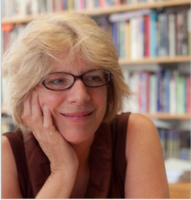 Today, I think that the field is challenged more than ever by the increased volatility of debates about what nations remember and consequentially forget. Monuments and memorials are being vandalized, torn down, officially removed. They can no longer be seen as simply part of an historical landscape. Much of this can be understood as battles over the historical narratives of monuments and their power, but it is also about tensions around who the nation mourns and who it sees or does not see as having a “grievable life” in Judith Butler’s term. So I see memory activism as a key site for the production of memory scholarship.
Today, I think that the field is challenged more than ever by the increased volatility of debates about what nations remember and consequentially forget. Monuments and memorials are being vandalized, torn down, officially removed. They can no longer be seen as simply part of an historical landscape. Much of this can be understood as battles over the historical narratives of monuments and their power, but it is also about tensions around who the nation mourns and who it sees or does not see as having a “grievable life” in Judith Butler’s term. So I see memory activism as a key site for the production of memory scholarship.
25.10.2021 | by Inês Beleza Barreiros
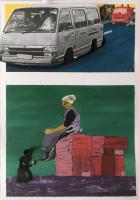 The article by Achille, I think, significantly points out the legitimacy of being limited from obtaining oxygen, by explicitly pointing out that for some parts of the world where healthcare is part of organized neglect, we are faced with more than just the need to physically breathe. There is a prohibition of breathing that is systemic in nature which is part of a larger need for the freedom to breathe (live). For example the violent killings of black civilians by the police in South Africa due to an unchecked implementation of COVID-19 laws and regulations left us questioning the relevance (need) for policing systems embedded in colonial rhetoric.
The article by Achille, I think, significantly points out the legitimacy of being limited from obtaining oxygen, by explicitly pointing out that for some parts of the world where healthcare is part of organized neglect, we are faced with more than just the need to physically breathe. There is a prohibition of breathing that is systemic in nature which is part of a larger need for the freedom to breathe (live). For example the violent killings of black civilians by the police in South Africa due to an unchecked implementation of COVID-19 laws and regulations left us questioning the relevance (need) for policing systems embedded in colonial rhetoric.
08.04.2021 | by Marcos Jinguba
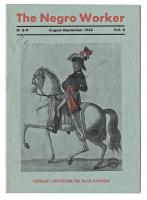 The significance of Mexico for this work is still emerging. Much more remains to be seen about just how deeply embedded the Mexican communists were in the radical networks across the Caribbean where black workers were predominant. Of what I have uncovered, the place of Mexico has two important functions in our historical understanding of the period. First, it was a place of refuge for not only radicals like the forced emigre from Republican Spain, but also for black revolutionaries like Jacques Roumain who spent some time there after being released from prison in Haiti and a short stint in Europe. Second, Mexico was the first people of color Communist nucleus in the western hemisphere, and the sense of anti-imperialism and sensitivity to chauvinism in the CPUSA was critical to strengthening the antiracist struggle across the region.
The significance of Mexico for this work is still emerging. Much more remains to be seen about just how deeply embedded the Mexican communists were in the radical networks across the Caribbean where black workers were predominant. Of what I have uncovered, the place of Mexico has two important functions in our historical understanding of the period. First, it was a place of refuge for not only radicals like the forced emigre from Republican Spain, but also for black revolutionaries like Jacques Roumain who spent some time there after being released from prison in Haiti and a short stint in Europe. Second, Mexico was the first people of color Communist nucleus in the western hemisphere, and the sense of anti-imperialism and sensitivity to chauvinism in the CPUSA was critical to strengthening the antiracist struggle across the region.
26.03.2021 | by The Public Archive
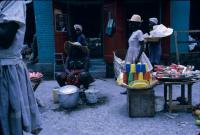 During the colonial era, the French colonists did not want to share anything with the slaves, including food. As the population grew and grew, the colonizers decided to give the slaves pieces of land called portion de vive which were to be used as a way for them to feed their own families. The producers on this land were so successful that they began to trade what they were growing.
During the colonial era, the French colonists did not want to share anything with the slaves, including food. As the population grew and grew, the colonizers decided to give the slaves pieces of land called portion de vive which were to be used as a way for them to feed their own families. The producers on this land were so successful that they began to trade what they were growing.
18.03.2021 | by The Public Archive
 I think it was really a mixture from the beginning but black teenagers from all the African ex-colonies, marginalised people, recognised themselves in the lyrics of American groups that talked about racism and social injustice, which they experienced in the US.
But since the beginning, white kids that were in school with these black communities liked the music, the attitude, the aesthetic and began to rap. So, it was a mixture from the beginning. General D, the first rapper to release an album in Portugal has Mozambican origins, for example. Nelson Neves, who is an important person in the film, was the one who brought the music from Paris because he spent vacations there, and he's the son of Cape Verdean parents. In Rapública you have white artists like Líderes de Nova Mensagem, which was a band that had black and white musicians, rappers and DJs, and they're from Almada.
I think it was really a mixture from the beginning but black teenagers from all the African ex-colonies, marginalised people, recognised themselves in the lyrics of American groups that talked about racism and social injustice, which they experienced in the US.
But since the beginning, white kids that were in school with these black communities liked the music, the attitude, the aesthetic and began to rap. So, it was a mixture from the beginning. General D, the first rapper to release an album in Portugal has Mozambican origins, for example. Nelson Neves, who is an important person in the film, was the one who brought the music from Paris because he spent vacations there, and he's the son of Cape Verdean parents. In Rapública you have white artists like Líderes de Nova Mensagem, which was a band that had black and white musicians, rappers and DJs, and they're from Almada.  I also think his music is quite special, and he was a very special person. He was very generous, doing a lot of social work, working with street children. He was very engaged in working for a society in the ‘90s that was starting to develop its own independence, since it was formally declared in 1974. It's not just his music, it's also the way he uses stories about the people that live in Santiago, in the interior and rural areas of the island.
I also think his music is quite special, and he was a very special person. He was very generous, doing a lot of social work, working with street children. He was very engaged in working for a society in the ‘90s that was starting to develop its own independence, since it was formally declared in 1974. It's not just his music, it's also the way he uses stories about the people that live in Santiago, in the interior and rural areas of the island.  He tells us about the important and complex mission that Amílcar Cabral delegated to them and what it was like to learn the crushing news of his assassination in the middle of this process. It fell to him as his first job to film Amílcar Cabral at an exhibition on the struggle in Conakry, in 1972, and then the transferring of his body to Bissau, capturing the commotion of the Guineans at the death of their greatest thinker and anti-colonial resistance leader.
He tells us about the important and complex mission that Amílcar Cabral delegated to them and what it was like to learn the crushing news of his assassination in the middle of this process. It fell to him as his first job to film Amílcar Cabral at an exhibition on the struggle in Conakry, in 1972, and then the transferring of his body to Bissau, capturing the commotion of the Guineans at the death of their greatest thinker and anti-colonial resistance leader.  A meeting with the authors of Tribuna Negra: Origens do Movimento Negro em Portugal (1911-1932), Cristina Roldão, José Pereira and Pedro Varela, resulted in this long conversation at BUALA.
The book presents a complex plot that neatly ties together the available information and many loose ends. As a research stance, the authors' interrogative formulation, acknowledging the limitations, leaves unanswered what we still don't know: “what have they said?”, “what have they done?”, it creates new questions and confirms how much research is yet to be done on Black Lisbon at the beginning of the 20th century. In fact, by reading the book, you get the feeling that each chapter could be another book.
A meeting with the authors of Tribuna Negra: Origens do Movimento Negro em Portugal (1911-1932), Cristina Roldão, José Pereira and Pedro Varela, resulted in this long conversation at BUALA.
The book presents a complex plot that neatly ties together the available information and many loose ends. As a research stance, the authors' interrogative formulation, acknowledging the limitations, leaves unanswered what we still don't know: “what have they said?”, “what have they done?”, it creates new questions and confirms how much research is yet to be done on Black Lisbon at the beginning of the 20th century. In fact, by reading the book, you get the feeling that each chapter could be another book.  It is important that a public work (especially a memorial) does not show just one face, but that it opens up to different readings. It is a plantation in mourning, burned, which reflects the lugubrious and funerary side of the plantation. And it also pays tribute to the resistance of the enslaved by the gesture of burning the plantation and boycotting the regime of oppression. The plantation is where the process of dehumanization occurs.
It is important that a public work (especially a memorial) does not show just one face, but that it opens up to different readings. It is a plantation in mourning, burned, which reflects the lugubrious and funerary side of the plantation. And it also pays tribute to the resistance of the enslaved by the gesture of burning the plantation and boycotting the regime of oppression. The plantation is where the process of dehumanization occurs.  Toy Boy has followed the various stages of the country’s post-independence and initiated his artistic practice after the civil war. His work is an expression of life in Luanda, intrinsically linked to the suffering and creativity one feels in the streets. In tune with the city’s artistic movements and circles (such as Elinga Teatro and Fuckin’ Globo), Toy Boy tells us his story with the sincerity and sensitivity that describe him. Dribbling the difficulties in his path and the need for survival, he appropriates a certain pop art, making collages or ready-mades, installations, and using recycled materials such as rust, but, above all, he gives body and voice to the singularities of urban life. In Luanda 2022.
Toy Boy has followed the various stages of the country’s post-independence and initiated his artistic practice after the civil war. His work is an expression of life in Luanda, intrinsically linked to the suffering and creativity one feels in the streets. In tune with the city’s artistic movements and circles (such as Elinga Teatro and Fuckin’ Globo), Toy Boy tells us his story with the sincerity and sensitivity that describe him. Dribbling the difficulties in his path and the need for survival, he appropriates a certain pop art, making collages or ready-mades, installations, and using recycled materials such as rust, but, above all, he gives body and voice to the singularities of urban life. In Luanda 2022.  French ethnologist Jean-Yves Loude returned to the “black city” for a workshop on the figure of Lisbon in literature (you can consult the program here) and insists on counteracting the manipulation of facts that erases the African contribution to the great achievements of the world.
In Lisbon in the Black City (2003) the narrator discovered a city full of signs of this African presence and showed us this privilege as Lisbon residents.
French ethnologist Jean-Yves Loude returned to the “black city” for a workshop on the figure of Lisbon in literature (you can consult the program here) and insists on counteracting the manipulation of facts that erases the African contribution to the great achievements of the world.
In Lisbon in the Black City (2003) the narrator discovered a city full of signs of this African presence and showed us this privilege as Lisbon residents.  In Kwanza-Sul, she noticed the various rhythms and grandiosity of a country that cultivates laughter and a short memory to defend itself from the dramas that dehumanize it: slavery, colonialism, domination, small and large powers, opportunism, and ignorance. How dizzying the scheme of history in everyday life is. The generation to which she belongs worried about recovering the lost cultural memory in these violences and others, also with a vivid and intriguing look of the naivety and militancy of independence. I
In Kwanza-Sul, she noticed the various rhythms and grandiosity of a country that cultivates laughter and a short memory to defend itself from the dramas that dehumanize it: slavery, colonialism, domination, small and large powers, opportunism, and ignorance. How dizzying the scheme of history in everyday life is. The generation to which she belongs worried about recovering the lost cultural memory in these violences and others, also with a vivid and intriguing look of the naivety and militancy of independence. I  For a long time, we treated art as an illustration, the idea that it was a product of its context. But what if we inverted that, since we live in an image civilization, and think of an image as a production, not a product, it produces values, it produces conceptions. And also, when you criticize internally that whiteness classification, we can go through a lot of different questions: who are the people being portrayed? They are, in general, men.
For a long time, we treated art as an illustration, the idea that it was a product of its context. But what if we inverted that, since we live in an image civilization, and think of an image as a production, not a product, it produces values, it produces conceptions. And also, when you criticize internally that whiteness classification, we can go through a lot of different questions: who are the people being portrayed? They are, in general, men.  Lee-Ann Olwage, who admits she struggles with her own mental health issues, also has family members who have suffered or are suffering from Alzheimer's. For this reason, she states that, with her work, she aims to create a space in which the people she photographs can play an active role in creating the images and that, above all, makes them feel like the true “heroines” of their own stories.
Lee-Ann Olwage, who admits she struggles with her own mental health issues, also has family members who have suffered or are suffering from Alzheimer's. For this reason, she states that, with her work, she aims to create a space in which the people she photographs can play an active role in creating the images and that, above all, makes them feel like the true “heroines” of their own stories.  It is said in Mexico that good life stories are passionate. They are happy and painful, they tie and untie blind knots in the throat, like a harsh swallow of cheap tequila.
We set the tone and enter one of the taciturn taverns of the city of Guanajuato - the so-called "cantinas", where personal tales are distilled as the glasses advance. Rough stone walls in the half-light, damp breath. In my head, Chavela Vargas sings "Tú me acostumbraste." It's night and it's raining softly outside.
With a toast, we seal the moment. And we tell a secret life story.
It is said in Mexico that good life stories are passionate. They are happy and painful, they tie and untie blind knots in the throat, like a harsh swallow of cheap tequila.
We set the tone and enter one of the taciturn taverns of the city of Guanajuato - the so-called "cantinas", where personal tales are distilled as the glasses advance. Rough stone walls in the half-light, damp breath. In my head, Chavela Vargas sings "Tú me acostumbraste." It's night and it's raining softly outside.
With a toast, we seal the moment. And we tell a secret life story.  Two hours with Mia Couto in an engaging conversation that covers various aspects of his interests and career, his affective geographies, the diversity of peoples and their ways of life as inspiration for the stories, the environment, and the development model to be discovered, and how to treat nature not as a "resource". We talked about hard times of violence, and the utopia of Mozambican Independence. Literary subjects do not predominate, although the Mozambican author wishes he had more time to dedicate to writing. Also thinking about how to take the pleasure of reading further and how to help bring out new writers. A writer in the terrain.
Two hours with Mia Couto in an engaging conversation that covers various aspects of his interests and career, his affective geographies, the diversity of peoples and their ways of life as inspiration for the stories, the environment, and the development model to be discovered, and how to treat nature not as a "resource". We talked about hard times of violence, and the utopia of Mozambican Independence. Literary subjects do not predominate, although the Mozambican author wishes he had more time to dedicate to writing. Also thinking about how to take the pleasure of reading further and how to help bring out new writers. A writer in the terrain.  Balanced between various cultures, he has lived for 31 years in a more open and diverse Lisbon, an openness and diversity to which people like Lucky have contributed so much, from building the city to making the city dance.
This is a city of hard times, but also of encounters and possibilities with which he has grown up. In this text, we are led by the memories of Dj Lucky, between various sound tracks of quisange, semba, and afro blues, and multiple tracks on the floor, from Kinshasa to the Graça neighborhood, passing through Luanda, Cova da Moura, and Bairro Alto.
Balanced between various cultures, he has lived for 31 years in a more open and diverse Lisbon, an openness and diversity to which people like Lucky have contributed so much, from building the city to making the city dance.
This is a city of hard times, but also of encounters and possibilities with which he has grown up. In this text, we are led by the memories of Dj Lucky, between various sound tracks of quisange, semba, and afro blues, and multiple tracks on the floor, from Kinshasa to the Graça neighborhood, passing through Luanda, Cova da Moura, and Bairro Alto.  Stuart Hall’s ironic use of “the west and the rest” is very real in the fixation among South Africans with “us” and “Africa”. It was encouraging that a sense of South Africa’s inextricable connectedness to the rest of the continent surfaced at moments in the FMF struggle. But the curiosity about and interest in African politics, literature, and academic knowledge still hasn’t really taken off, whether among students or established scholars.
Stuart Hall’s ironic use of “the west and the rest” is very real in the fixation among South Africans with “us” and “Africa”. It was encouraging that a sense of South Africa’s inextricable connectedness to the rest of the continent surfaced at moments in the FMF struggle. But the curiosity about and interest in African politics, literature, and academic knowledge still hasn’t really taken off, whether among students or established scholars.  I think we always have the responsibility of looking into the ghosts of these colonial dreams and taking the ideas further. For example, we must rethink what are artwork features and what exactly defines them? Institutions change, in a slow and tedious way, but it happens. If we also think about the thesis and how it is configurated, how free can we be about the aesthetic part of it? Now we can offer “decolonize art studies” as a course. All the reconfigurations are a very long process to be achieved. A very important thing I would like to highlight is that where you are you must do your work and contribution. We should try to influence others with our work, inspiring them and trying to change what we know is wrong.
I think we always have the responsibility of looking into the ghosts of these colonial dreams and taking the ideas further. For example, we must rethink what are artwork features and what exactly defines them? Institutions change, in a slow and tedious way, but it happens. If we also think about the thesis and how it is configurated, how free can we be about the aesthetic part of it? Now we can offer “decolonize art studies” as a course. All the reconfigurations are a very long process to be achieved. A very important thing I would like to highlight is that where you are you must do your work and contribution. We should try to influence others with our work, inspiring them and trying to change what we know is wrong.  My work has always been focused round connection. I’ve always wanted to tell stories that even though you know the audience and the subject might be different I would want the audience to look at the photo, the subjects, and each detail and for them to be able to see something similar.
Most people that look at my most recent project “MIXED” and probably don’t necessarily think of themselves as mixed, however if we really look back at history and ethnicity it’s clear that we are all mixed, we just haven’t identified it . We all came from Africa and our genetic disposition is remarkably similar. The only differences we notice are as a result of our ancestors colonising different parts of our planet. Effectively we’re all mixed as racial purity is a complete myth.
My work has always been focused round connection. I’ve always wanted to tell stories that even though you know the audience and the subject might be different I would want the audience to look at the photo, the subjects, and each detail and for them to be able to see something similar.
Most people that look at my most recent project “MIXED” and probably don’t necessarily think of themselves as mixed, however if we really look back at history and ethnicity it’s clear that we are all mixed, we just haven’t identified it . We all came from Africa and our genetic disposition is remarkably similar. The only differences we notice are as a result of our ancestors colonising different parts of our planet. Effectively we’re all mixed as racial purity is a complete myth.  Today, I think that the field is challenged more than ever by the increased volatility of debates about what nations remember and consequentially forget. Monuments and memorials are being vandalized, torn down, officially removed. They can no longer be seen as simply part of an historical landscape. Much of this can be understood as battles over the historical narratives of monuments and their power, but it is also about tensions around who the nation mourns and who it sees or does not see as having a “grievable life” in Judith Butler’s term. So I see memory activism as a key site for the production of memory scholarship.
Today, I think that the field is challenged more than ever by the increased volatility of debates about what nations remember and consequentially forget. Monuments and memorials are being vandalized, torn down, officially removed. They can no longer be seen as simply part of an historical landscape. Much of this can be understood as battles over the historical narratives of monuments and their power, but it is also about tensions around who the nation mourns and who it sees or does not see as having a “grievable life” in Judith Butler’s term. So I see memory activism as a key site for the production of memory scholarship.  The article by Achille, I think, significantly points out the legitimacy of being limited from obtaining oxygen, by explicitly pointing out that for some parts of the world where healthcare is part of organized neglect, we are faced with more than just the need to physically breathe. There is a prohibition of breathing that is systemic in nature which is part of a larger need for the freedom to breathe (live). For example the violent killings of black civilians by the police in South Africa due to an unchecked implementation of COVID-19 laws and regulations left us questioning the relevance (need) for policing systems embedded in colonial rhetoric.
The article by Achille, I think, significantly points out the legitimacy of being limited from obtaining oxygen, by explicitly pointing out that for some parts of the world where healthcare is part of organized neglect, we are faced with more than just the need to physically breathe. There is a prohibition of breathing that is systemic in nature which is part of a larger need for the freedom to breathe (live). For example the violent killings of black civilians by the police in South Africa due to an unchecked implementation of COVID-19 laws and regulations left us questioning the relevance (need) for policing systems embedded in colonial rhetoric.  The significance of Mexico for this work is still emerging. Much more remains to be seen about just how deeply embedded the Mexican communists were in the radical networks across the Caribbean where black workers were predominant. Of what I have uncovered, the place of Mexico has two important functions in our historical understanding of the period. First, it was a place of refuge for not only radicals like the forced emigre from Republican Spain, but also for black revolutionaries like Jacques Roumain who spent some time there after being released from prison in Haiti and a short stint in Europe. Second, Mexico was the first people of color Communist nucleus in the western hemisphere, and the sense of anti-imperialism and sensitivity to chauvinism in the CPUSA was critical to strengthening the antiracist struggle across the region.
The significance of Mexico for this work is still emerging. Much more remains to be seen about just how deeply embedded the Mexican communists were in the radical networks across the Caribbean where black workers were predominant. Of what I have uncovered, the place of Mexico has two important functions in our historical understanding of the period. First, it was a place of refuge for not only radicals like the forced emigre from Republican Spain, but also for black revolutionaries like Jacques Roumain who spent some time there after being released from prison in Haiti and a short stint in Europe. Second, Mexico was the first people of color Communist nucleus in the western hemisphere, and the sense of anti-imperialism and sensitivity to chauvinism in the CPUSA was critical to strengthening the antiracist struggle across the region.  During the colonial era, the French colonists did not want to share anything with the slaves, including food. As the population grew and grew, the colonizers decided to give the slaves pieces of land called portion de vive which were to be used as a way for them to feed their own families. The producers on this land were so successful that they began to trade what they were growing.
During the colonial era, the French colonists did not want to share anything with the slaves, including food. As the population grew and grew, the colonizers decided to give the slaves pieces of land called portion de vive which were to be used as a way for them to feed their own families. The producers on this land were so successful that they began to trade what they were growing. 